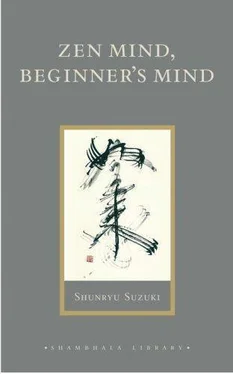Wherever we go, we should not lose this way of life. That is called “being Buddha,” or “being the boss.” Wherever you go you should be the master of your surroundings. This means you should not lose your way. So this is called Buddha, because if you exist in this way always, you are Buddha himself. Without trying to be Buddha you are Buddha. This is how we attain enlightenment. To attain enlightenment is to be always with Buddha. By repeating the same thing over and over, we will acquire this kind of understanding. But if you lose this point and take pride in your attainment or become discouraged because of your idealistic effort, your practice will confine you by a thick wall. We should not confine ourselves by a self-built wall. So when zazen time comes, just to get up, to go and sit with your teacher, and to talk to him and listen to him, and then go home again-all these procedures are our practice. In this way, without any idea of attainment, you are always Buddha, This is true practice of zazen. Then you may understand the true meaning of Buddha’s first statement, “See Buddha nature in various beings, and in every one of us.”
“Before the rain stops we can hear a bird. Even under the heavy snow we see snowdrops and some new growth.”
Here in America we cannot define Zen Buddhists the same way we do in Japan. American students are not priests and yet not completely laymen. I understand it this way: that you are not priests is an easy matter, but that you are not exactly laymen is more difficult. I think you are special people and want some special practice that is not exactly priest’s practice and not exactly laymen’s practice. You are on your way to discovering some appropriate way of life. I think that is our Zen community, our group.
But we must also know what our undivided original way is and what Dogen’s practice is. Dogen-zenji said that some may attain enlightenment and some may not. This is a point I am very much interested in. Although we all have the same fundamental practice which we carry out in the same way, some may attain enlightenment and some may not. It means that even if we have no experience of enlightenment, if we sit in the proper way with the right attitude and understanding of practice, then that is Zen. The main point is to practice seriously, and the important attitude is to understand and have confidence in big mind.
We say “big mind,” or “small mind,” or “Buddha mind,” or “Zen mind,” and these words mean something, you know, but something we cannot and should not try to understand in terms of experience. We talk about enlightenment experience, but it is not some experience we will have in terms of good or bad, time or space, past or future. It is experience or consciousness beyond those distinctions or feelings. So we should not ask, “What is enlightenment experience?” That kind of question means you do not know what Zen experience s. Enlightenment cannot be asked for in your ordinary way of thinking. When you are not involved in this way of thinking, you have some chance of understanding what Zen experience is.
The big mind in which we must have confidence is not something which you can experience objectively. It is something which is always with you, always on your side. Your eyes are on your side, for you cannot see your eyes, and your eyes cannot see themselves. Eyes only see things outside, objective things. If you reflect on yourself, that self is not your true self any more. You cannot project yourself as some objective thing to think about. The mind which is always on your side is not just your mind, it is universal mind, always the same, not different from another’s mind. It is Zen mind. It is big, big mind. This mind is whatever you see. Your true mind is always with whatever you see. Although you do not know your own mind, it is there-at the very moment you see something, it is there. This is very interesting. Your mind is always with the things you observe. So you see, this mind is at the same time everything.
True mind is watching mind. You cannot say, “This is myself, my small mind, or my limited mind, and that is big mind.” That is limiting yourself, restricting your true mind, objectifying your mind. Bodhidharma said, “In order to see a fish you must watch the water.” Actually when you see water you see the true fish. Before you see Buddha nature you watch your mind. When you see the water there is true nature. True nature is watching water. When you say, “My zazen is very poor,” here you have true nature, but foolishly you do not realize it. You ignore it on purpose. Tliere is immense importance in the “I” with which you watch your mind. That I is not the “big I”; it is the “I” which is incessantly active, always swimming, always flying through the vast air with wings. By wings I mean thought and activity. The vast sky is home, my home. There is no bird or air. When the fish swims, water and fish are the fish. There is nothing but fish. Do you understand? You cannot find Buddha nature by vivisection. Reality cannot be caught by thinking or feeling mind. Moment after moment to watch your breathing, to watch your posture, is true nature. There is no secret beyond this point.
We Buddhists do not have any idea of material only, or mind only, or the products of our mind, or mind as an attribute of being. What we are always talking about is that mind and body, mind and material are always one. But if you listen carelessly it sounds as if we are talking about some attribute of being, or about “material” or “spiritual.” That will be a version of it, maybe. But actually we are pointing out mind which is always on this side, which is true mind. Enlightenment experience is to figure out, to understand, to realize this mind which is always with us and which we cannot see. Do you understand? If you try to attain enlightenment as if you see a bright star in the sky, it will be beautiful and you may think, “Ah, this is enlightenment,” but that is not enlightenment. That understanding is literally heresy. Even though you do not know it, in that understanding you have the idea of material only. Dozens of your enlightenment experiences are like that-some material only, some object of your mind, as if through good practice you found that bright star. That is the idea of self and object. It is not the way to seek for enlightenment.
The Zen school is based on our actual nature, on our true mind as expressed and realized in practice. Zen does not depend on a particular teaching nor does it substitute teaching for practice. We practice zazen to express our true nature, not to attain enlightenment. Bodhidharma’s Buddhism is to be practice, to be enlightenment. At first this may be a kind of belief, but later it is something the student feels or already has. Physical practice and rules are not so easy to understand, maybe especially for Americans. You have an idea of freedom which concentrates on physical freedom, on freedom of activity. This idea causes you some mental suffering and loss of freedom. You think you want to limit your thinking, you think some of your thinking is unnecessary or painful or en tangling; but you do not think you want to limit your physical activity. For this reason Hyakujo established the rules and way of Zen life in China. He was interested in expressing and transmitting the freedom of true mind. Zen mind is transmitted in our Zen way of life based on Hyakujo’s rules.
I think we naturally need some way of life as a group and as Zen students in America, and as Hyakujo established our way of monastic life in China, I think we must establish an American way of Zen life. I am not saying this jokingly, I am pretty serious. But I do not want to be too serious. If we become too serious we will lose our way. If we are playing games we will lose our way. Little by little with patience and endurance we must find the way for ourselves, find out how to live with ourselves and with each other. In this way we will find out our precepts. If we practice hard, concentrate on zazen, and organize our life so that we can sit well, we will find out what we are doing. But you have to be careful in the rules and way you establish. If it is too strict you will fail, if it is too loose, the rules will not work. Our way should be strict enough to have authority, an authority everyone should obey. The rules should be possible to observe. This is how Zen tradition was built up, decided little by little, created by us in our practice. We cannot force anything. But once the rules have been decided, we should obey them completely until they are changed. It is not a matter of good or bad, convenient or inconvenient. You just do it without question. That way your mind is free. The important thing is to obey your rules without discrimination. This way you will know the pure Zen mind. To have our own way of life means to encourage people to have a more spiritual and adequate way of life as human beings. And I think one day you will have your own practice in America.
Читать дальше


![Джон Харгрейв - Mind Hacking [How to Change Your Mind for Good in 21 Days]](/books/404192/dzhon-hargrejv-mind-hacking-how-to-change-your-min-thumb.webp)








